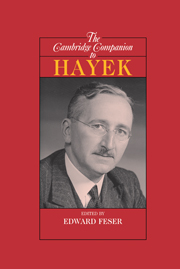Book contents
- Frontmatter
- Introduction
- 1 Hayek and the Austrian tradition
- 2 Hayek on money and the business cycle
- 3 Hayek and market socialism
- 4 Hayek and Marx
- 5 Hayek versus Keynes: the road to reconciliation
- 6 Hayek on knowledge, economics, and society
- 7 Hayek and Popper: the road to serfdom and the open society
- 8 Hayek’s politics
- 9 Hayek the philosopher of law
- 10 Hayek and liberalism
- 11 Hayek and conservatism
- 12 Hayek on the evolution of society and mind
- 13 Hayek on justice and the order of actions
- 14 Hayek the cognitive scientist and philosopher of mind
- Guide to Further reading
- Bibliography
- Index
Introduction
Published online by Cambridge University Press: 28 January 2007
- Frontmatter
- Introduction
- 1 Hayek and the Austrian tradition
- 2 Hayek on money and the business cycle
- 3 Hayek and market socialism
- 4 Hayek and Marx
- 5 Hayek versus Keynes: the road to reconciliation
- 6 Hayek on knowledge, economics, and society
- 7 Hayek and Popper: the road to serfdom and the open society
- 8 Hayek’s politics
- 9 Hayek the philosopher of law
- 10 Hayek and liberalism
- 11 Hayek and conservatism
- 12 Hayek on the evolution of society and mind
- 13 Hayek on justice and the order of actions
- 14 Hayek the cognitive scientist and philosopher of mind
- Guide to Further reading
- Bibliography
- Index
Summary
Friedrich August von Hayek (1899-1992) was almost certainly the most consequential thinker of the mainstream political right in the twentieth century. It is just possible that he was the most consequential twentieth-century political thinker, right or left, period. The apparent triumph of global capitalism at the dawn of the twenty-first century owes as much to his influence on policymakers and shapers of public opinion as it does to that of any other intellectual figure. Hayek's semi-popular book The Road to Serfdom (1944) was a key text of the emerging New Right, a movement whose influence ultimately made possible the elections of Margaret Thatcher, Ronald Reagan, and George W. Bush. Reagan claimed that his thinking on economics was directly influenced by Hayek's writings. Thatcher famously tried once to end debate on Conservative Party policy by slamming a copy of Hayek's more dryly academic tome The Constitution of Liberty (1960) down on the table and exclaiming, “This is what we believe!” Even Winston Churchill, long before the New Right's ascendancy, was moved by an (apparently superficial) reading of The Road to Serfdom to warn that the election of his opponent Clement Attlee in 1945 might result in the institution of a “Gestapo” to enforce Attlee's socialist economic policy. (Many suggested at the time that this rash charge might have cost Churchill the election; Hayek's influence on politicians did not always entail their political success.) A John Rawls or Isaiah Berlin, however much greater was the esteem with which such thinkers were regarded by most of their academic peers, could only envy such direct impact on practical politics.
- Type
- Chapter
- Information
- The Cambridge Companion to Hayek , pp. 1 - 12Publisher: Cambridge University PressPrint publication year: 2006
- 2
- Cited by



